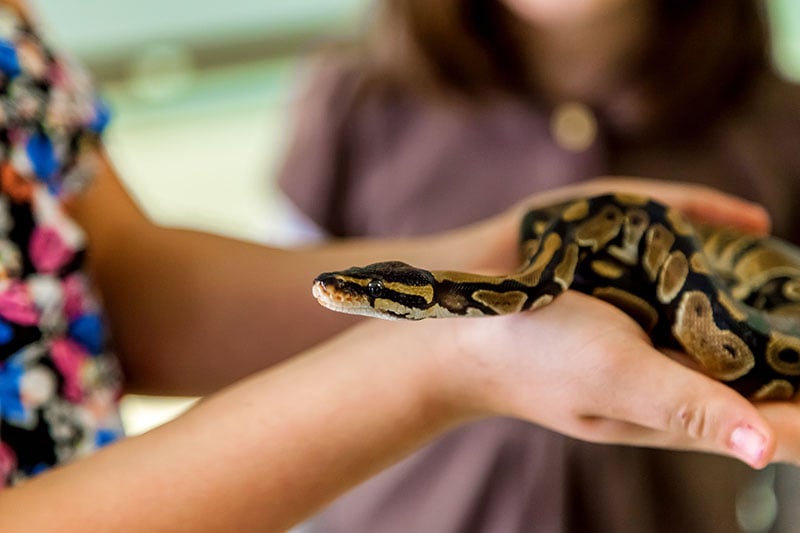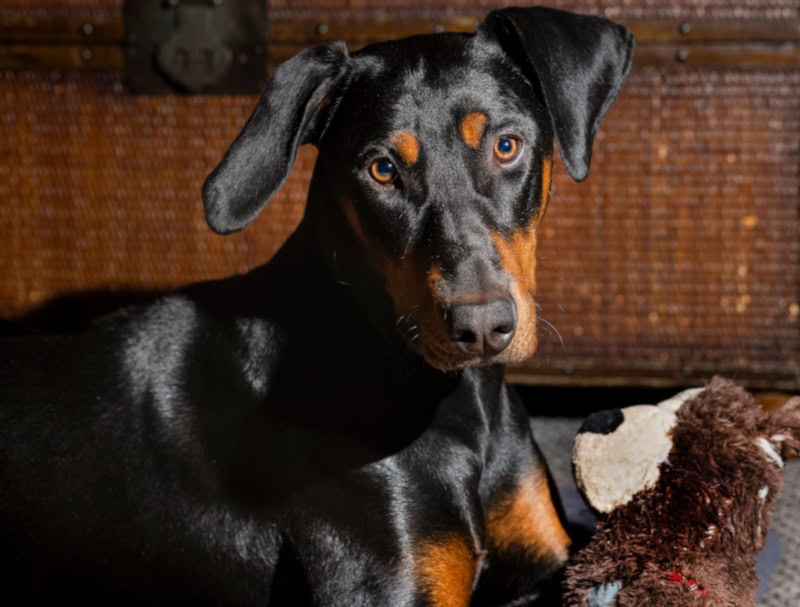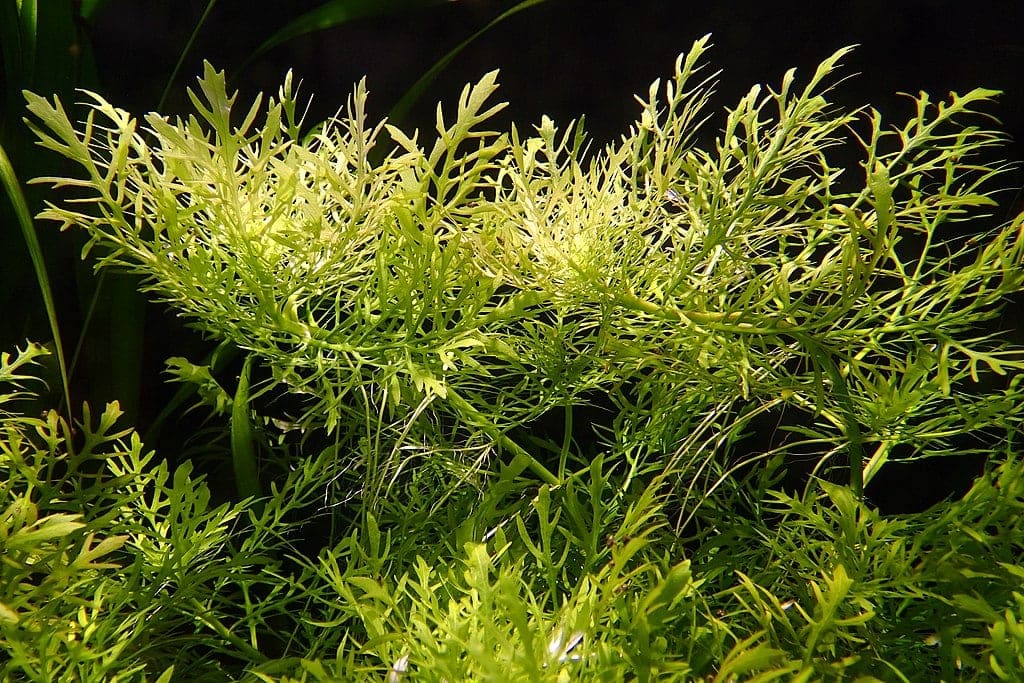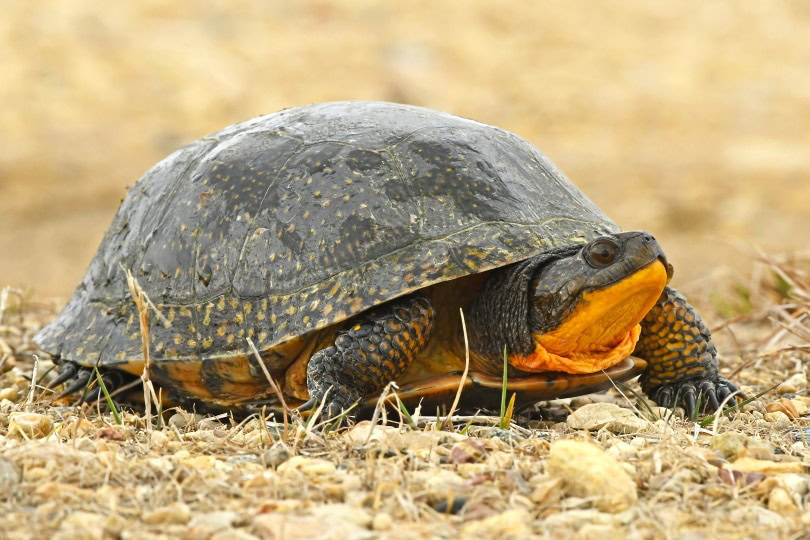VET APPROVED

The information is current and up-to-date in accordance with the latest veterinarian research.
Learn more »Click to Skip Ahead
Ball Pythons, like most snakes, are independent animals. When these reptiles are kept as pets, owners need to prioritize meeting their care requirements. You may be able to handle your snake occasionally, but in most cases, Ball Pythons do not like being held or petted. They don’t form a close bond or relationship with their owners. You should only handle your Ball Python when necessary and avoid touching them at all when they’re shedding, immediately after they’ve eaten, or when they’re being introduced to a new enclosure.
Too much handling can cause stress and may also lead to problems with shedding. A stressed Ball Python, though not deadly due to having no venom, may still bite.

Ball Pythons in the Wild
Ball Pythons originate from western Africa, where they live in rainforests. They can climb but spend most of their time at the ground level, living in underground burrows. These carnivores eat small mammals, including gerbils, and live up to 15 years. Ball Pythons do have natural predators, though they are only usually predated upon when they are young. Small Pythons might be hunted by large spiders, birds, and wild dogs.
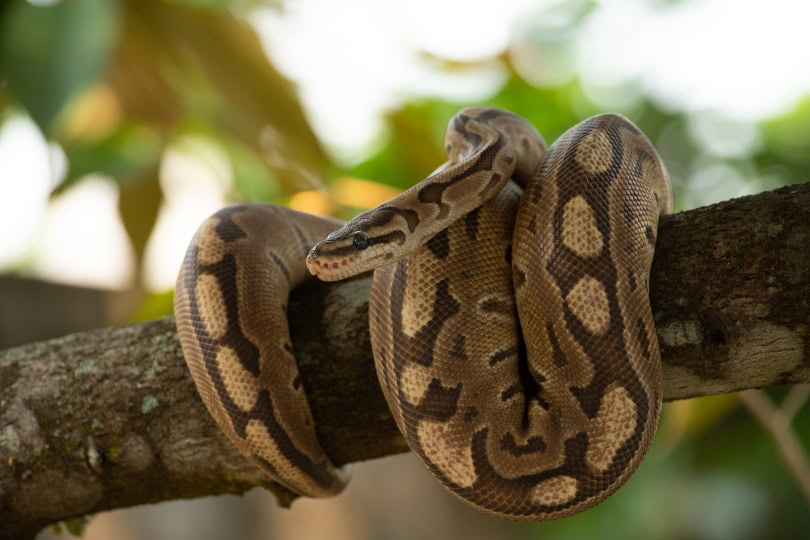
Ball Pythons as Pets
Please note that in certain parts of the world (including a few states in the U.S.), it might be illegal to own a ball python (or any snake).1
Some counties, states, or countries might require a license to keep snakes. Although there are jurisdictions that only require licenses for venomous snakes (and Ball Pythons are not venomous), you should always check the laws where you live before deciding to adopt a snake.
As one of the most popular pet snakes, the Ball Python is considered easy to care for, at least compared to other species. You do need to ensure that their enclosure is kept clean and that they have ideal temperature and humidity levels. You also need to feed them regularly, with most owners preferring to serve frozen mice and rats rather than live ones. Beyond that, snakes are good visual pets. They don’t like to be disturbed and don’t crave the attention of their humans or others.
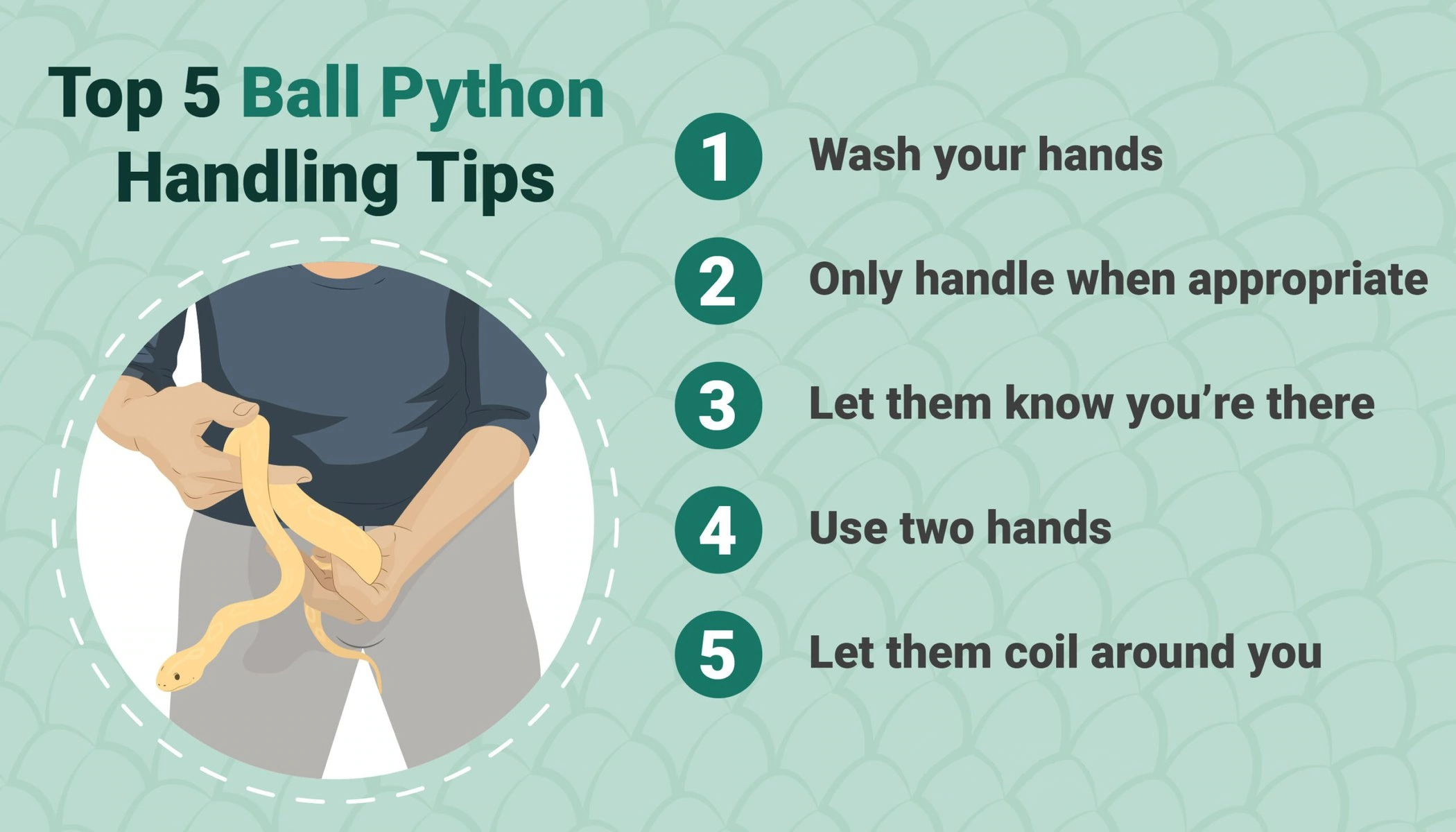
Do They Like to Be Held?
In the wild, Ball Pythons lead solitary lives, rarely coming into contact with other snakes and staying out of the way of animals other than prey. Owners need to try to replicate these conditions for their pet Pythons, which means keeping handling to a minimum. That said, some touching is necessary—for example, if the snake needs to be taken to the vet—and this task is easier if the snake is accustomed to it. Therefore, it is a good idea to handle them fairly regularly.

The Top 5 Ball Python Handling Tips
Many Ball Pythons occasionally bite their handlers. You should only handle your Python when absolutely necessary. Children should not be allowed to handle pet snakes.
A certain amount of handling of your Ball Python should be considered part of their care. You will need to remove them from the enclosure while you clean, to take them in for any treatment, and in other cases. If your Python hasn’t been handled at all, they may react negatively to being picked up. You should try to handle your snake twice a week and certainly no more than once a day. Each session should last no longer than 10 minutes.
When handling, there are a few rules to follow.
1. Wash Your Hands
Snakes rely heavily on their sense of smell because they have poor eyesight. One of the most common reasons snakes bite their owners is that they mistake the smell of their human for that of food. If you’ve eaten or handled anything that might be considered a good snack, a Ball Python may bite. Washing your hands gets rid of these smells and helps prevent the potential spread of diseases. Wash your hands before and after handling your snake.
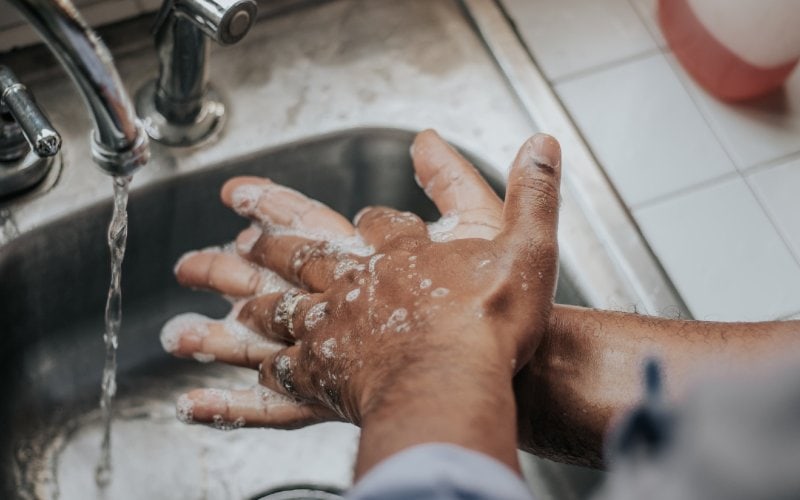
2. Only Handle When Appropriate
Don’t handle your snake while they’re shedding. Snakes already have poor eyesight, and it is worse during shedding. Leave your Ball Python to shed in peace.
Don’t handle them until at least 2 days after they’ve eaten. Handling too soon after a meal can cause the snake to regurgitate their food, which in turn, can be fatal.
3. Let Them Know You’re There
Before picking your Python up, you need to let them know you’re there. Gently touch and brush their back so you don’t startle them when you reach underneath them.
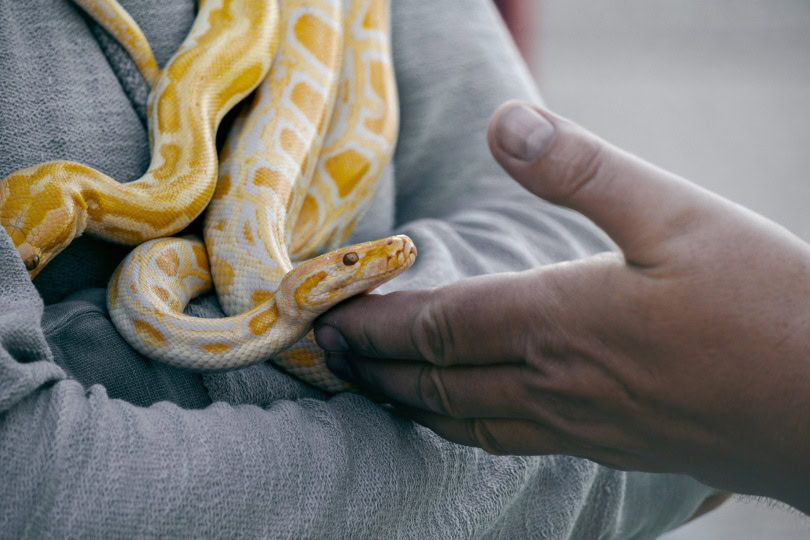
4. Use Two Hands
Never lift a snake by their tail. It will stress the snake out and may cause injury. You need to pick the snake up confidently but not too tightly. Use both hands, ensure that you support the head with one hand, and lift them out of the enclosure.
5. Let Them Coil Around You
If a Ball Python curls up in a ball while on your hand, it likely means that they’re stressed, and you should return them to the safety of their enclosure. The snake should try to wrap around your arm, and they may lift their head to investigate you and what is going on. Let the Python coil around your arm because this is how they grip and prevent themselves from falling.
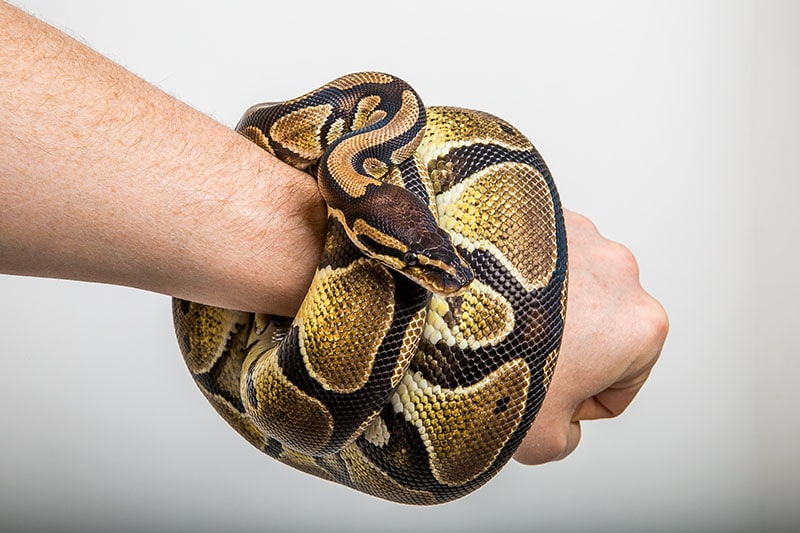

Frequently Asked Questions (FAQ)
Do Ball Pythons Like Being Petted?
Ball Pythons do not like being petted and aren’t keen on being held. They are solitary animals that prefer to be left alone. Some inquisitive Pythons may enjoy a few minutes of investigating your hand and your general smell, however.
Can a Ball Python Recognize Their Owner?
Snakes in general may be able to recognize individuals, primarily by their smell. However, they don’t form any kind of attachment or bond, which means that if your snake reacts positively to your presence, they’re likely just anticipating food.
What If My Ball Python Hisses at Me?
Hissing is one of the few forms of communication that a snake has, so while it can be a sign of aggression, this isn’t necessarily always the case. Hissing may be a sign of fear, or if it happens at seemingly random times, it could be a sign of a respiratory infection.
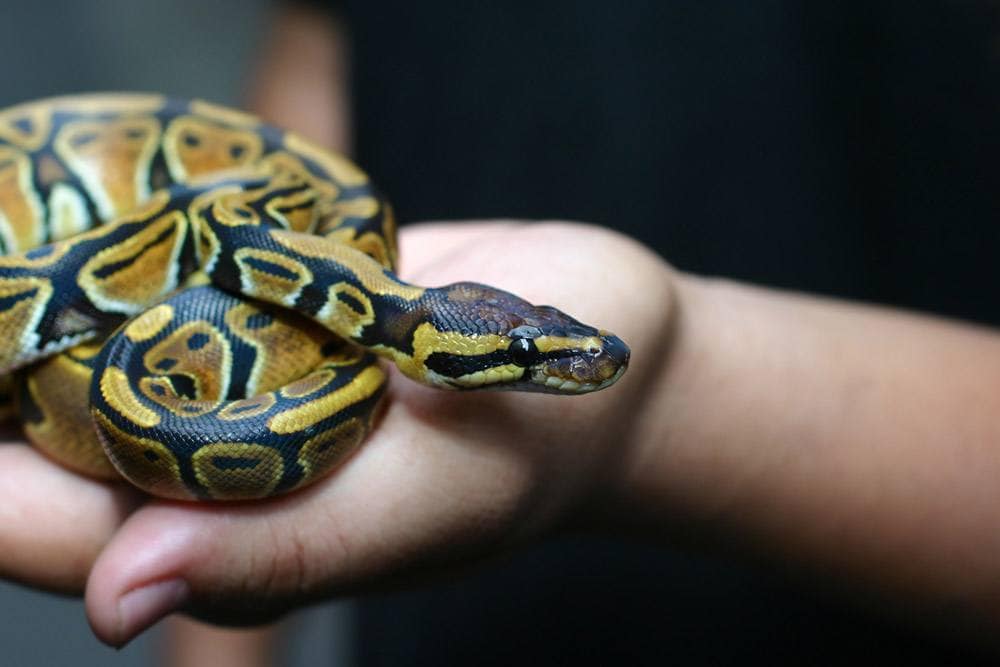
Do Ball Python Bites Hurt?
If you own a Ball Python, chances are high that you will get bitten at some point. Whether it is because the snake mistakes you for food or because they’re scared, the snake’s natural response is to bite. Ball Pythons are not venomous, so their bites are not fatal. While they have sharp teeth, their jaws are not particularly strong, which means that the teeth might puncture your skin, but the bite shouldn’t cause much pain at all. It has been compared to that of a paper cut.
If your snake does bite, don’t simply pull them away, as this can cause severe damage to its teeth. Python teeth curve backward, so you need to move the snake toward the bite location to unhook the teeth.

Conclusion
The Ball Python is one of the most popular pet snake species. They are considered docile and relatively easy to care for, though you do need to ensure ideal temperature and humidity levels. While they can bite, this usually only happens when the snake is scared or mistakes you for food, and Ball Python bites aren’t particularly painful.
Despite the risk of being bitten, owners need to handle their snakes at least a couple of times a week to get them used to it. This is necessary for moving the snake when their enclosure is being cleaned and if they need to visit a vet. However, Ball Pythons, like all snakes, are solitary animals and do not enjoy being held or petted for the most part.
- https://www.everythingreptiles.com/ball-python/
- https://www.zsea.org/banham/animals/royal-python
- https://www.avianandexotic.com/care-sheets/reptiles/ball-python
- https://exopetguides.com/reptiles/snakes/do-snakes-like-to-be-petted
- https://petownersguide.com/do-ball-pythons-like-to-be-held/
- https://reptifiles.com/ball-python-care-guide/ball-python-handling-tips
- https://mypetpython.com/washing-hands-before-and-after-snake-handling/
- https://reptilecraze.com/why-your-ball-python-hisses-at-you/
- https://animal-club.co.uk/do-pet-snakes-recognise-their-owners
- https://www.terrariumquest.com/ball-python/bite/
Featured Image Credit: In The Light Photography, Shutterstock
